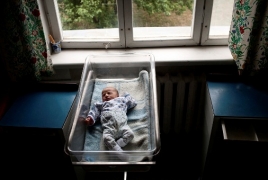
Anna (the name is changed) is from Yerevan. She decided to become a surrogate for a couple, whose attempts to have children during 16 years of marriage proved fruitless.
“My decision was conditioned by financial problems. Being a single parent, I took the decision when the going got tough. First and foremost, I set myself up for it, both physically and psychologically not to have problems after the childbirth. I convinced myself that this child is not mine genetically and I am just acting as an aquarium. If you make up your mind right, you will not have that silver cord,” she says.
As for the public opinion, Anna says: “This is not an immoral deed. No one is immune to hardships. If the opponents to surrogate maternity were in my place or experienced the feelings of a childless couple, they wouldn’t speak that way. I was happy to help these people become parents. I don’t live to be judged by anyone, as no one would pay my debts. Of course, troubles take place… Couples, who resort to a surrogate mother, usually conceal the truth from the child.”
Asked whether she explained her decision to her own child, Anna says: “My kid was 7 years old at that time and during the final pregnancy months he lived with his grandma. I tried to protect him from any moral shock.”
PanARMENIAN.Net also talked with Lusine Balayan, an obstetrician-gynecologist at the Yerevan Research Center of Maternal and Child Health Protection, where 13 children were born by surrogacy in 2015. This year’s number is also 13.
“The Armenian society has an ambiguous opinion about surrogate maternity. Each person has the right to own point of view. I respect any standpoint whether it coincides with my own or not. However, only the people who came across such a problem or studied it have the right to discuss it. It’s up to a woman to decide on surrogate maternity and up to childless couples to choose this option if all other possibilities have been exhausted,” she says.
“For example, church believes that childless couples should come to terms with their fate. My position is different. If a patient has a chance to prolong life by means of kidney transplantation, we struggle for it. Surrogate maternity attempts are not 100% successful. According to statistical data, positive result is registered in 35-45% of cases; and if the child is born, this means that it had to be born. Besides, science is developing and nowadays, many people get a chance to be treated and become parents even in case of an unfavorable diagnosis,” Balayan adds.
“Only the couples, who have tried all other means to cure infertility, resort to our surrogate maternity program. Of course, any of these couples can adopt a child, but many people have an overwhelming desire to bring up a child, who is theirs genetically. I lot of time will pass till surrogacy will cease being a subject of debates. All we can now is to accept the fact that has become a part of our life and be happy for the families, who will finally have a child,” Balayan says.
As to the psychological preparedness of women, who want to be surrogates, Balayan says: “This topic is surronded with myths and prejudices, while numerous talk-shows and films add guesswork to it. Before becoming a surrogate mother, a woman undergoes a check-up, including conversations with a psychologist. Almost all of them comprehend that the child they are going to give birth to is not theirs. Our center has been working with surrogate mothers for 10 years already. I talk to these women every day and it doesn’t present a difficulty to create a psychological profile of our candidates.”
Thus, according to Balayan, not every woman can become a surrogate. “All of them have one thing in common -serious financial problems,” Balayan says. However, she notes, many of them say they are happy to see the eyes of the parents who were waiting for a baby for years.
Commenting on the legal aspect of the issue, Balayan says that some problems do exist. “Some nuances are regulated by the legislation, the other are still being discussed. During a government session in November 2016, an amendment stipulating the surrogate mother and biological parents to undergo a DNA test was adopted,” she says.
“The law demands that a surrogate must not have genetic linkage with the fetus and at least one of the spouses must be a biological parent of the child, who will be given to them only after a DNA testing,” Balayan concludes.

